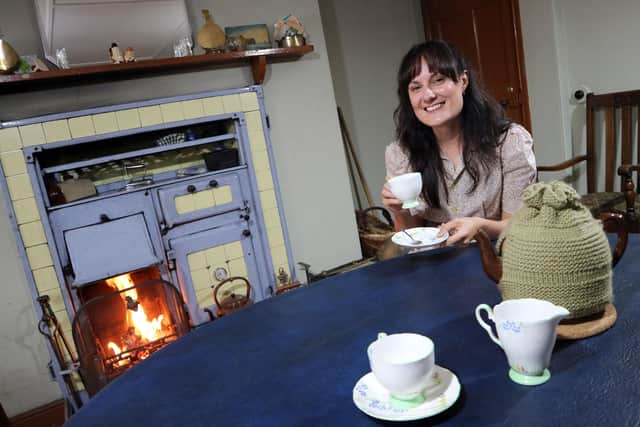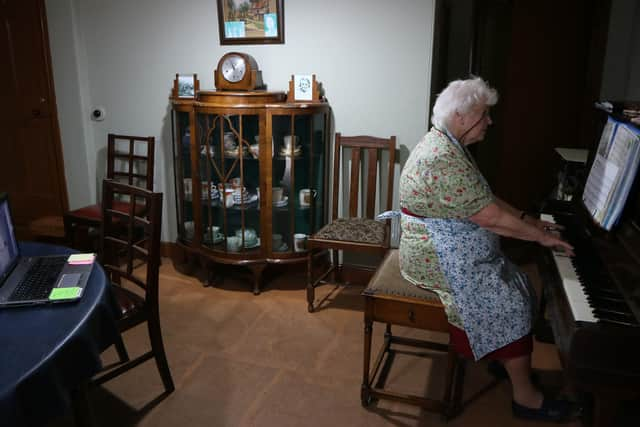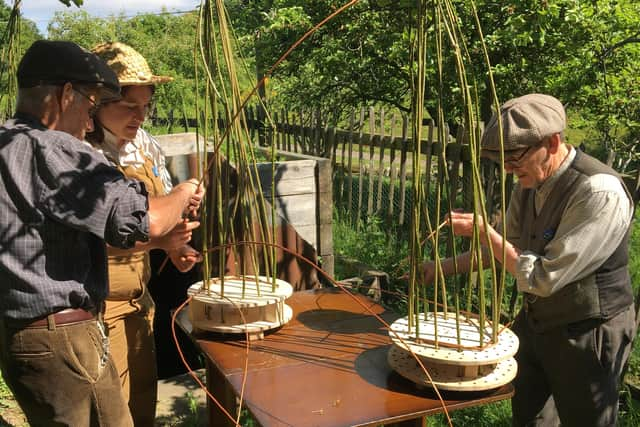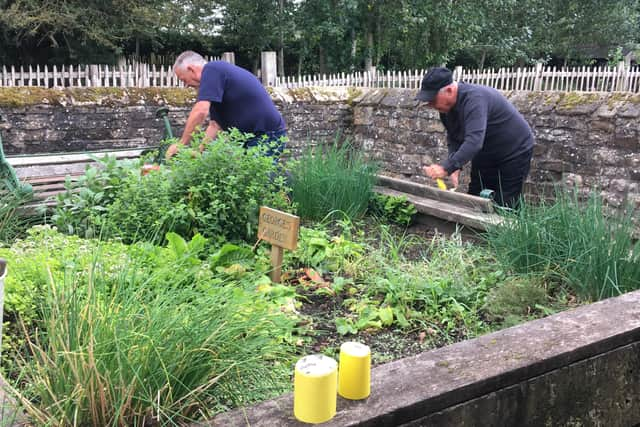Beamish Museum takes visitors back in time to support people living with dementia
and live on Freeview channel 276
Now this principle is being taken a step further by using the museum’s historic settings to provide comfort and familiarity to people suffering from dementia.
Each week, residents from care homes across the region visit Orchard Cottage on the wartime farm to take part in a range of activities as part of the museum’s Health and Wellbeing Programme.
Advertisement
Hide AdAdvertisement
Hide AdStimulating activities include baking on the cottages 1940s coal fired oven, cooking toast on the open fire, listening to music from the 40s and 50s on the record player, tending to the plants and vegetables in the garden and allotment and looking at old photographs and magazines.
Programme head Michelle Kindleysides said: “It’s about getting people together around the table in the cottage for a nice cup of tea and a chat. The participants often want to make the tea or put the jam on their own scones and to feel like they are doing something useful again, which is great for self-confidence.
"We always have the fire on and it’s about creating a nice relaxing and familiar environment for people to feel comfortable.
"Often after someone is diagnosed with dementia, people are quick to do those everyday tasks for them, but it’s important to keep your brain active. It’s that principle of use it or lose it.”


Advertisement
Hide AdAdvertisement
Hide AdThe sessions always culminate in a sing-along around the cottage’s piano which is led by volunteer Ruth Young, who at 86 is a similar age to many of those attending the sessions.
Ruth, a former teacher from Chester-le-Street, said: “I absolutely love going along. We play a lot of the wartime classics such as We’ll meet Again and they all seem to love it and want to sing along.
"I’ve started playing songs from the Sound of Music, which is from a bit later on, and I’m getting my selection of Christmas songs prepared.
"I’m from the same era and I really feel close to them. Even within the two hour session you can see some people really come out of themselves.


Advertisement
Hide AdAdvertisement
Hide Ad“I put numbered song sheets around the room and people shout out which ones they want. They’ll often say “oh I know this one” and it really seems to take them back to a period they remember from earlier in their life.
Michelle added: “People who don’t remember those day to day things will all of a sudden remember all these songs. I remember one man, who was here with his wife, getting up and starting to play the piano and his wife was singing along.
"He had stopped speaking for a number of years. His wife was in tears and I just remember her saying “thank you for bringing him back”.
It’s this principle of using living history and creating a familiar environment which underpins the projects success


Advertisement
Hide AdAdvertisement
Hide AdMichelle added: “We look at pictures and magazines from their youth and people will often say “I remember buying that”.”
It’s a sentiment shared by Sandra Falkner, founder of North East Dementia Care in Pennywell.
Sandra, 73, said: “One of my day care visitors goes to Beamish and he’s always telling me how much he loves it. While people with dementia may struggle to recall things which happened recently they often have a much more vivid memory of their youth and childhood.
"The sessions at Beamish sound a fantastic idea. We do similar things at our centre where we will often watch old films, look at old photographs and listen to music from the 50s and 60s.”
Advertisement
Hide AdAdvertisement
Hide AdAnother popular activity is the Best Foot Forward Walking Group which, while not exclusive to people with dementia, caters for their needs.
Jane Bedingfield, who leads the group, said: “We do a different route each week and people get to stretch their legs. Again it’s about doing so in the familiarity of and environment which relaxes people and gets them interacting.”


While difficult to quantify the impact of the initiative, Michelle has no doubts about its affects.
She said: “During the height of the pandemic we had to close, although we did virtual sessions online during this time. I think the pandemic and the isolation it has created has had a massive impact on both people with dementia and people’s mental health in general.
Advertisement
Hide AdAdvertisement
Hide Ad"Since restrictions eased the demand for our support sessions has been huge.”
Following the success of the dementia initiative a Men’s Group has been created which provides specific support for men with dementia but also other males who may be suffering from mental health issues. Two sessions run each week and a number of participants have been referred to the scheme from their GP or social prescribers.
One group member, who asked to remain anonymous, said: “I was going through a bad time when I finished work and my doctor from the mental health team asked me if I would like to join a Men’s Group at Beamish. I wasn’t sure at first and it was a struggle to go, but I went along the first week and was made really welcome.
"I found it hard, but as the weeks went on I settled into the group really well. When I look back it was the best thing I’ve done. I would advise anyone to do it.”
Advertisement
Hide AdAdvertisement
Hide AdIn keeping with the museum’s principle of creating historic settings within the living memory of visitors, the sessions will soon be moving the aged miners cottages being constructed in the new 1950s town.
Michelle said: “As time moves on it’s important to keep the settings relevant in people’s minds. Beamish is a much loved attraction across the North East and participants still get excited about coming here and it doesn’t feel like a clinical environment.”
A message from the editor:
Support our journalism and subscribe to this website to enjoy unlimited access to news, sport, retro, daily puzzles and more online.
With a digital subscription, you can read more than five articles, see fewer ads, enjoy faster load times, and get access to exclusive newsletters.
Click ‘Subscribe’ in the menu to find out more and sign up.
Comment Guidelines
National World encourages reader discussion on our stories. User feedback, insights and back-and-forth exchanges add a rich layer of context to reporting. Please review our Community Guidelines before commenting.
